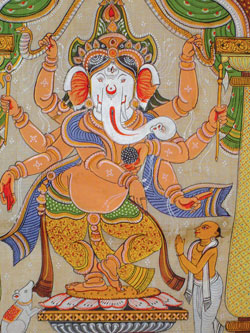 Affairs of state in the teetering kingdom shifted from blood sport to participatory democracy last week as the long awaited interim government convened in Singha Durbar. The welcome sight of bitter enemies boring each other silly with long-winded speeches brought a wave of nostalgia for the pre-war era, when politics was simply a harmless exercise in buffoonery. Ministerial antics and scandals of yore came to mind while watching this new crop angle for perks and privilege.
Affairs of state in the teetering kingdom shifted from blood sport to participatory democracy last week as the long awaited interim government convened in Singha Durbar. The welcome sight of bitter enemies boring each other silly with long-winded speeches brought a wave of nostalgia for the pre-war era, when politics was simply a harmless exercise in buffoonery. Ministerial antics and scandals of yore came to mind while watching this new crop angle for perks and privilege.
The intense eight party bickering for ministry posts set a familiar tone of high drama and low comedy, while reminding us the spoils of power is all they really crave.
Our prime minister's reputation for wily infighting and devious manipulation was reinforced by his adept deflection of Maoist demands for the seat of deputy pm that would have put them only a heartbeat away (his) from the top job. Watching him out-manoeuvre all players was world class entertainment, and his ploy of abolishing the post rather than seeing it occupied by a nemesis was a Machiavellian masterstroke.
Despite rumours that the comrades wouldn't settle for anything less than the Home Ministry, this key post was somehow retained by the man who, last we looked, had millions baying for his resignation.
Happenstance weighed in with an extra giggle as parliament convened on April Fool's, and provided the prime minister an ideal excuse to immediately depart for the SAARC meeting in Delhi. His petty efforts while there to exclude Sahana Pradhan, the newly anointed United Marxist-Leninist foreign minister, from all important meetings proved that some things never change.
Being a firm believer in the 'anything for a laugh' philosophy, the Hand was grateful for the generous contributions from the newly-democratic Maoists to the flow of national level gaffes. Their alleged metamorphosis from law-breakers to law-makers may still leave much to be desired, considering behavioural quirks like extortion, abduction and coercion continue apace, but the rationale that even these characters won't wage war on their own government lends comfort. The novel opportunity to hold them publicly accountable for their statements and actions is unprecedented and a distinct improvement over the impunity they have always enjoyed. Watching the comrades struggle to mollify their abrasive behaviour patterns and join the ranks of statesmen, like teenagers in a new suit, comes as a welcome source of amusement.
Comrade Mahara initiated his tenure as Minister for Information and Communications with a virulent attack on Miss Nepal and all she stands for, while Supremo Pushpa Kamal Dahal pledged that the Tibetan government-in-exile and ythe Dalai Lama would never be allowed to establish an office in Nepal, together disposing of beauty queens and Nobel Peace Prize laureates during their very first week in office.
Awarding the Ministry of Physical Planning and Works to the party that has spent a decade destroying the country's infrastructure was good for a laugh and shows a subtle sense of irony and justice. When a journalist asked whether the Maoists now regret wrecking so many bridges and police posts, Minister Yami snapped that this would mean regretting the whole civil war. I couldn't have put it better myself.
The years of strife took all the fun out of politics, but if the past week is any indication we're in for a couple of hilarious months ahead. With a wink and a prayer to the god of new ventures, the Hand plans on banking a few laughs while he can, and advises the reader to do the same, as humour is likely to be in short supply come election time.'


